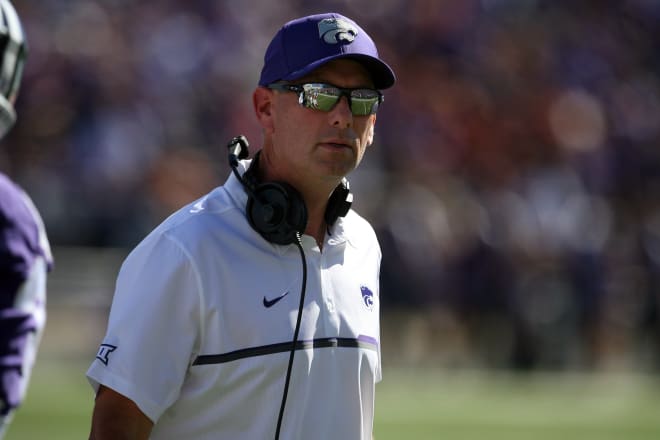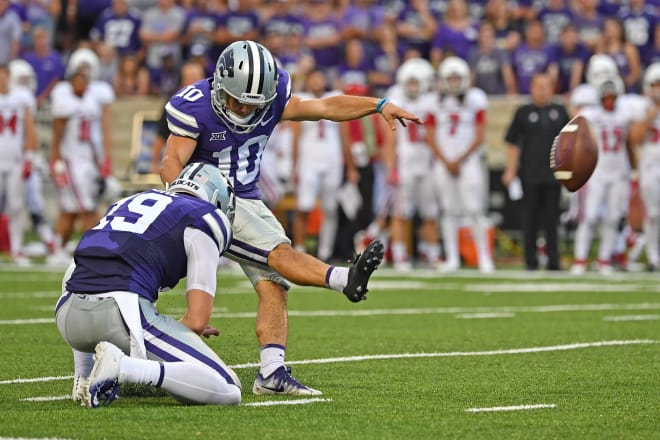100 Questions: Can special teams continue success?

***Yesterday's Question HERE***
In an attempt to pass the time this off-season we're fortunate to have secured the help of scottwildcat from Boscoe's Boys. Scott is going to provide 100 questions about the past, present, future (and who-knows-what) involving Kansas State sports, and I'll do my very best to answer them.
Let's dive in to the 100 Questions.
Question No. 27: With self admittance in a few press opportunities, coach Klieman said they didn't put as much focus on special teams as they may have liked because they were doing install on offense and defense in the spring. How much (if any) of a drop off will K-State special teams see this season?
To me, special teams questions are kind of the elephant in the room nobody is really addressing - including myself.
Kansas State has been arguably the best special teams program in the country over the course of the last quarter century. In fact, I think you'd be hard pressed to find a program as consistently successful in this aspect of the game as K-State has been since, well, about 1989.
It didn't happen by accident.
There had long been a perception former special teams coordinator Sean Snyder's role was tied specifically to kickers and punters, not the return units regularly making game-changing plays for the Wildcats.
I believed this, too, before taking the time to learn a little more about it.
Sources since have made pretty clear Snyder was responsible for those units, as well, including making all calls and adjustments on game day in the return game. Other assistants certainly helped on units and had responsibility, as well, but it was Snyder's unit.
Saying Snyder had nothing to do with the return game would be like saying an offensive coordinator had nothing to do with a running back, since he's not the running backs coach.
The younger Snyder - for better or worse - regularly became a target of criticism towards the end of his father's run leading the K-State program. If I'm being transparent and honest, I typically found that surprising. K-State's special teams units were often fantastic and won a number of games for the Wildcats over the last 25 years, even if the 2018 group had its issues.
This piece is not a criticism of Chris Klieman not having Sean Snyder on his coaching staff in a traditional sense. I think a head coach should pick his staff and use the 10 spots in what they believe to be the best interests of their team, and Klieman has done that. It's not rare to pass on having a special teams coordinator.
This isn't even a criticism, either, of how Klieman used spring practices.
It is, however, an honest admission I have some concern about this unit heading into 2019.

As Scott noted in his question, the special teams units were put on the back burner throughout spring practice as K-State focused the vast, vast majority of its attention in installing offensive and defensive schemes.
Klieman was extremely transparent in expressing this, noting there would be catching up needed on special teams.
Kicker Blake Lynch and punter Devin Anctil both return, giving K-State solid building blocks for success on special teams.
But will game-changing returns and elite kickoff coverage (one of the more under appreciated parts of K-State's success in Snyder 2.0) still be a staple of K-State football?
Like the success referenced at the start of this piece, it won't happen by accident.
Klieman has divided up responsibilities on special teams throughout the staff, including using offensive graduate assistant Stanton Weber to help out with the kickers and punters. Sean Snyder, of course, is also still in the building. He'll be able to provide help, but not to coach in the manner a traditional coach would.
At the end of the day, it's pretty easy to project this unit to dip some. K-State has gone from having a dedicated special teams coordinator and spending tons of time on the unit in practice to having nobody specifically in that role and not truly working on the unit during the spring.
The production of the group is almost certain to drop off. The questions then become how big of a drop off takes place, and and can the extra resources (coaching staff, practice time, etc.) devoted to the offensive and defensive sides of the ball make up for the difference?
